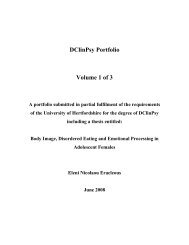PhD thesis - University of Hertfordshire Research Archive
PhD thesis - University of Hertfordshire Research Archive
PhD thesis - University of Hertfordshire Research Archive
You also want an ePaper? Increase the reach of your titles
YUMPU automatically turns print PDFs into web optimized ePapers that Google loves.
and improve response during the study period, this latter effect was beyond<br />
control.<br />
Table 3. Response rates by health authority over the surveillance period.<br />
Health Authority<br />
Question-<br />
naires<br />
Isolates Response<br />
(%)<br />
42<br />
Response by<br />
study year<br />
1 2 3<br />
Barnet Enfield and<br />
Haringey<br />
510 206 248 95 270 470<br />
Birmingham 2007 2829 71 74 71 67<br />
Bradford 1079 200 540 214 ∞ ∞<br />
Bro Taf 537 1245 43 0 108 50<br />
North Cumbria 0 682 0 0 0 0<br />
Dyfed Powys 104 587 18 31 16 0<br />
East Kent 684 1082 63 9800 40 32<br />
Hereford 386 150 257 86 ∞ ∞<br />
Lancashire † 1264 2669 47 40 56 50<br />
Leeds 2084 3307 63 67 64 57<br />
Leicester 1255 1464 86 109 87 62<br />
Manchester ‡<br />
4780 4613 104 89 122 112<br />
North Devon 1027 1823 56 59 66 42<br />
North Essex 1181 1506 78 69 92 75<br />
Nottingham 1872 2541 74 73 85 62<br />
Southampton and south 1617<br />
west Hampshire<br />
1793 90 102 108 54<br />
Total 20387 26697 76 74 86 69<br />
* , Questionnaires received as a percentage <strong>of</strong> isolates referred; † ,North West and South Lancashire health<br />
authorities; ‡ , Bury and Rochdale, Manchester, Salford and Trafford, Stockport, West Pennine & Wigan and Bolton<br />
health authorities.<br />
Figure 4 overleaf shows the age distribution <strong>of</strong> cases where isolates were<br />
received and questionnaires referred. Whilst the two datasets appear to be<br />
generally comparable, some subtle differences are apparent. Young adults<br />
were under represented amongst the questionnaire data and the opposite is<br />
true for older adults and the elderly. The latter reflects the fact that this age<br />
group is notoriously difficult to recruit into epidemiological studies. At the<br />
other end <strong>of</strong> the spectrum, older people may be retired and therefore have<br />
more free time to complete and return questionnaires.

















